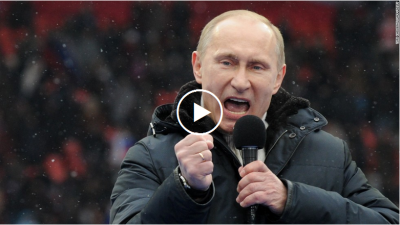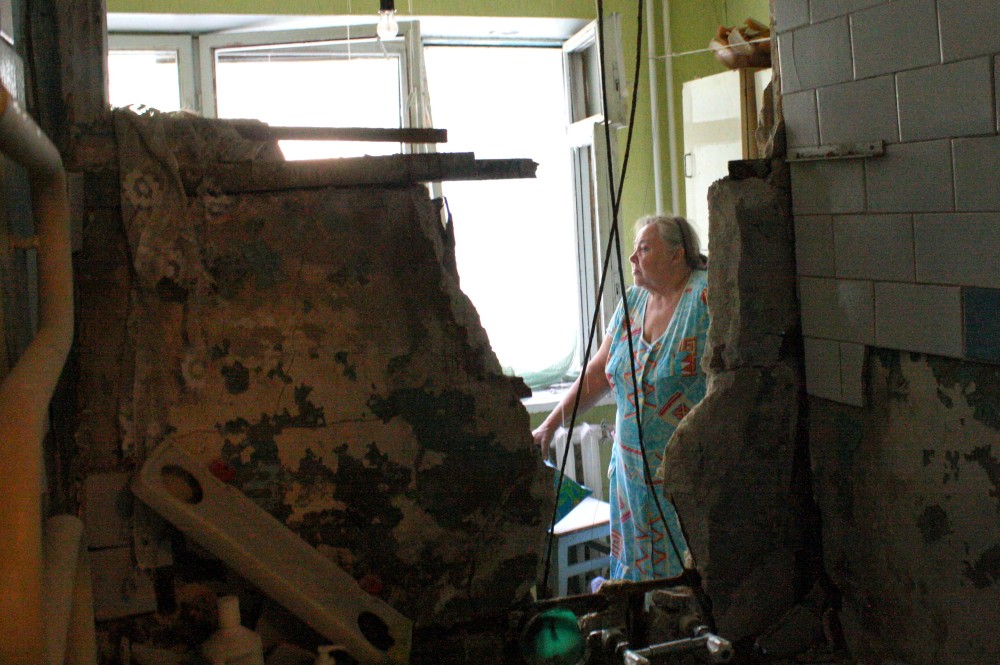CNN Peddles Propaganda About “Completely Mad” Putin

CNN‘s illustration of a possibly “completely mad” Putin. Or maybe he just opens his mouth when he talks.
“Has Russian President Vladimir Putin gone completely mad?”
That’s the lead of a news analysis (2/11/15) by Matthew Chance, CNN‘s senior international correspondent in Moscow.
Here’s a better question: Does CNN care whether it’s viewed as an outlet for crude anti-Russian propaganda?
Chance claims that his opening attack is a “question…actually being debated in serious circles.” His first example of this is an offhand remark supposedly made by German Chancellor Andrea Merkel to US President Barack Obama that Putin is “in another world.”
Common sense tells you, of course, that when people say someone is “in another world,” they don’t generally mean that they are actually psychotic. For what it’s worth, Merkel’s office said she hadn’t meant to imply any such thing, clarifying that her point was that “Putin has a different perception on Crimea.”
Chance says Merkel’s comment was made “a few months ago”; actually, the conversation between the NATO leaders happened on March 1, 2014–about two weeks shy of a year ago–and was the subject of a propaganda cycle at the time (FAIR Blog, 3/12/14). Which raises the question of what it’s doing here as exhibit A that currently a serious debate going on over Putin’s mental health.
But Chance’s first example is about six years younger than his second–and final–piece of evidence that Putin’s sanity is “actually being debated.” This is a 2008 report from a Pentagon think tank that supposedly says “the Russian leader may have Asperger’s Syndrome, a type of high-functioning autism.” Yes,CNN suggested that possibly having Asperger’s Syndrome is evidence that one might be “completely mad.”
It should go without saying that Asperger’s is not associated with delusions or irrational behavior; indeed, CNN itself says this diagnosis from a distance “may account for his apparently high degree of control.” (USA Today, which obtained the Pentagon report, says it suggests Putin’s “behavior and facial expressions reveal someone who is defensive in large social settings.”) And “experts told CNN they were skeptical of the reliability of the Asperger’s claim.” Nevertheless, Chance presents the Defense Department’s seven-year-old psychological speculation as half of his evidence for his proposition that whether Putin is “completely mad” is a current debate in “serious circles.”
Clearly, genuinely serious circles do not include CNN‘s Moscow bureau.
What McClatchy DC‘s Mark Seibel (3/5/14) had to say at the time about the original propaganda campaign around Merkel’s “another world” remark is worth repeating:
In the world of propaganda, successfully portraying your adversary as being crazy, without any rational backing to his actions, makes it unnecessary to try to understand the complexities or sensitivities of the issues. If Putin is crazy, then that’s enough. We needn’t think any further about what he has to say.
That seems to be the point of the remainder of Chance’s article: that the political positions taken by Putin are “completely mad,” or at the very least the actions of “an enigma.” For example, there’s “his unflinching support for rebel separatists in Eastern Ukraine, despite their alleged excesses,” which are said to have “plunged Russia’s relations with the West into their worst crisis since the end of the Cold War.”
This Ukrainian woman’s house was hit by a rocket, apparently launched by the side one can support without questions being raised about your mental health. (photo: Human Rights Watch)
No mention of whether “unflinching support” for the Ukrainian government in Kiev, despite its own “excesses”–which include “arbitrary detentions, torture and enforced disappearances of people suspected of ‘separatism and terrorism,'” in the words of the UN high commissioner for human rights (12/15/14), and “indiscriminately rocketing civilian areas,” according to Human Rights Watch (Washington Post,7/25/14)–raises the question of whether Western leaders are “completely mad.”
Putin’s backing for the rebels shows he is “determined to get his way in Ukraine,” writes Chance. He explains this means autonomy for southeastern Ukraine, recognition of the Russian language there, and a buffer zone–”but Putin may actually want much more.” “A large hint” as to what this might be: Putin told an Egyptian newspaper (Al-Ahram, 2/9/15), “Promises of non-expansion of the NATO to the east have turned out to be hollow statements.”
Putin is referring to statements like US Secretary of State James Baker’s 1990 assertion at the Kremlin that there would be “no extension of NATO’s jurisdiction for forces of NATO one inch to the east.” Baker later insisted he was only promising that NATO forces within Germany would not move into what was then Soviet-dominated East Germany; Putin, understandably, reads it as a US double cross.
Putin’s statement to the Egyptian paper is the quote upon which Chance hangs his analysis that “a solution to the Ukraine crisis, then, may involve ruling the country out of any future NATO membership, however unpalatable that may be to some in the West.” CNN‘s Moscow correspondent then warns, on the basis of nothing other than his own say-so, that “the bigger problem, though, is that this may not end with Ukraine”:
Putin’s ultimate goal may be to tear up the post-Soviet assumptions about what Russia will tolerate, and permanently change Russia’s relationship with the West.
How dare Russia’s president try to change Russia’s relationship with the West? Why, he must be completely mad!
You can send feedback on CNN‘s website, on Facebook or on Twitter(@CNN; @MChanceCNN). Please remember that respectful communication is most effective.


